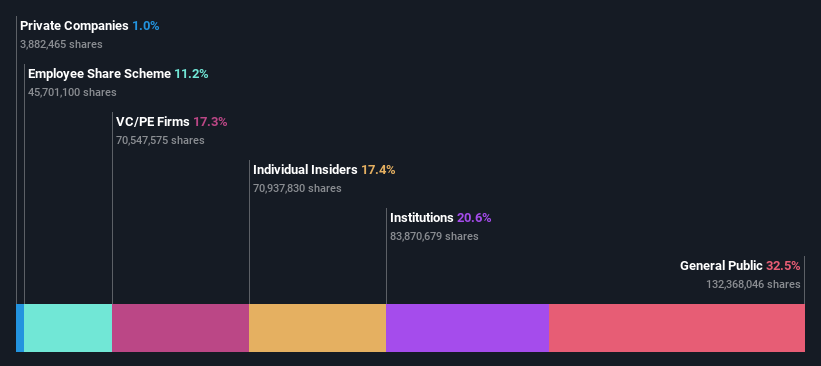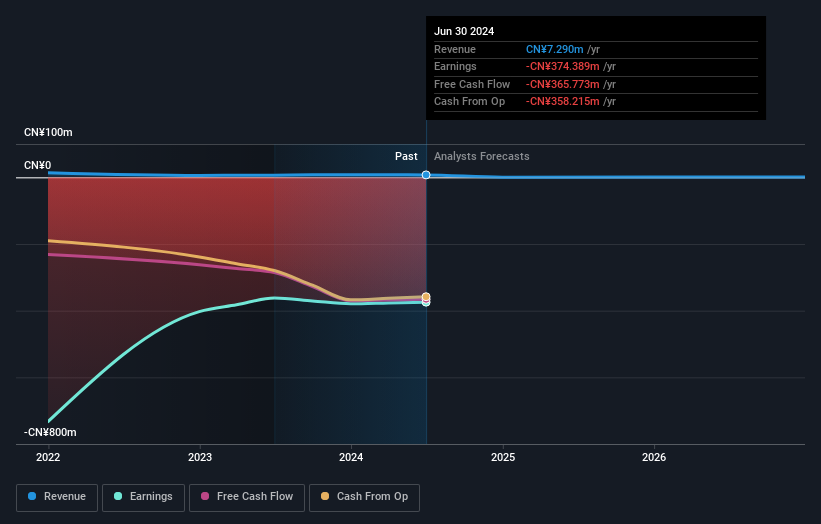Institutions along with retail investors who hold considerable shares inImmuneOnco Biopharmaceuticals (Shanghai) Inc. (HKG:1541) come under pressure; lose 11% of holdings value
Key Insights
- The considerable ownership by retail investors in ImmuneOnco Biopharmaceuticals (Shanghai) indicates that they collectively have a greater say in management and business strategy
- 51% of the business is held by the top 5 shareholders
- Insider ownership in ImmuneOnco Biopharmaceuticals (Shanghai) is 17%
If you want to know who really controls ImmuneOnco Biopharmaceuticals (Shanghai) Inc. (HKG:1541), then you'll have to look at the makeup of its share registry. And the group that holds the biggest piece of the pie are retail investors with 32% ownership. That is, the group stands to benefit the most if the stock rises (or lose the most if there is a downturn).
While the holdings of retail investors took a hit after last week’s 11% price drop, institutions with their 21% holdings also suffered.
Let's delve deeper into each type of owner of ImmuneOnco Biopharmaceuticals (Shanghai), beginning with the chart below.
View our latest analysis for ImmuneOnco Biopharmaceuticals (Shanghai)

What Does The Institutional Ownership Tell Us About ImmuneOnco Biopharmaceuticals (Shanghai)?
Institutional investors commonly compare their own returns to the returns of a commonly followed index. So they generally do consider buying larger companies that are included in the relevant benchmark index.
We can see that ImmuneOnco Biopharmaceuticals (Shanghai) does have institutional investors; and they hold a good portion of the company's stock. This can indicate that the company has a certain degree of credibility in the investment community. However, it is best to be wary of relying on the supposed validation that comes with institutional investors. They too, get it wrong sometimes. When multiple institutions own a stock, there's always a risk that they are in a 'crowded trade'. When such a trade goes wrong, multiple parties may compete to sell stock fast. This risk is higher in a company without a history of growth. You can see ImmuneOnco Biopharmaceuticals (Shanghai)'s historic earnings and revenue below, but keep in mind there's always more to the story.

We note that hedge funds don't have a meaningful investment in ImmuneOnco Biopharmaceuticals (Shanghai). The company's CEO Tian Wenzhi is the largest shareholder with 17% of shares outstanding. With 11% and 9.4% of the shares outstanding respectively, ImmuneOnco Biopharmaceuticals (Shanghai) Inc. , ESOP and Shanghai Yongkan Investment Management Co., Ltd. are the second and third largest shareholders.
Our research also brought to light the fact that roughly 51% of the company is controlled by the top 5 shareholders suggesting that these owners wield significant influence on the business.
While studying institutional ownership for a company can add value to your research, it is also a good practice to research analyst recommendations to get a deeper understand of a stock's expected performance. There is a little analyst coverage of the stock, but not much. So there is room for it to gain more coverage.
Insider Ownership Of ImmuneOnco Biopharmaceuticals (Shanghai)
The definition of an insider can differ slightly between different countries, but members of the board of directors always count. Company management run the business, but the CEO will answer to the board, even if he or she is a member of it.
Insider ownership is positive when it signals leadership are thinking like the true owners of the company. However, high insider ownership can also give immense power to a small group within the company. This can be negative in some circumstances.
It seems insiders own a significant proportion of ImmuneOnco Biopharmaceuticals (Shanghai) Inc.. It has a market capitalization of just HK$1.9b, and insiders have HK$326m worth of shares in their own names. This may suggest that the founders still own a lot of shares. You can click here to see if they have been buying or selling.
General Public Ownership
The general public, who are usually individual investors, hold a 32% stake in ImmuneOnco Biopharmaceuticals (Shanghai). While this size of ownership may not be enough to sway a policy decision in their favour, they can still make a collective impact on company policies.
Private Equity Ownership
With a stake of 17%, private equity firms could influence the ImmuneOnco Biopharmaceuticals (Shanghai) board. Some might like this, because private equity are sometimes activists who hold management accountable. But other times, private equity is selling out, having taking the company public.
Next Steps:
It's always worth thinking about the different groups who own shares in a company. But to understand ImmuneOnco Biopharmaceuticals (Shanghai) better, we need to consider many other factors. To that end, you should learn about the 3 warning signs we've spotted with ImmuneOnco Biopharmaceuticals (Shanghai) (including 2 which are potentially serious) .
If you are like me, you may want to think about whether this company will grow or shrink. Luckily, you can check this free report showing analyst forecasts for its future.
NB: Figures in this article are calculated using data from the last twelve months, which refer to the 12-month period ending on the last date of the month the financial statement is dated. This may not be consistent with full year annual report figures.
Have feedback on this article? Concerned about the content? Get in touch with us directly. Alternatively, email editorial-team (at) simplywallst.com.
This article by Simply Wall St is general in nature. We provide commentary based on historical data and analyst forecasts only using an unbiased methodology and our articles are not intended to be financial advice. It does not constitute a recommendation to buy or sell any stock, and does not take account of your objectives, or your financial situation. We aim to bring you long-term focused analysis driven by fundamental data. Note that our analysis may not factor in the latest price-sensitive company announcements or qualitative material. Simply Wall St has no position in any stocks mentioned.
① During the campaign period, US stocks, US stocks short selling, US stock options, Hong Kong stocks, and A-shares trading will maintain at $0 commission, and no subscription/redemption fees for mutual fund transactions. $0 fee offer has a time limit, until further notice. For more information, please visit: https://www.webull.hk/pricing
② More than 40M Downloads Globally : data based on Webull Technologies Limited's internal statistics as of July 14, 2023.
③ Pre-market (4:00 AM - 9:30 AM ET) , after-hours (4:00 PM - 8:00 PM ET) .
Webull Securities Limited is licensed with the Securities and Futures Commission of Hong Kong (CE No. BNG700) for carrying out Type 1 License for Dealing in Securities, Type 2 License for Dealing in Futures Contracts and Type 4 License for Advising on Securities.

English